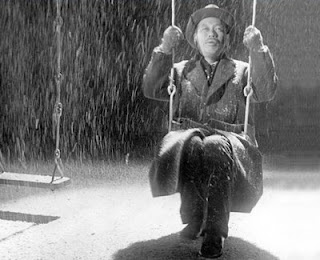 Filled with heartbreak and insight, Akira Kurosawa’s gently personal Ikiru marks a high point in an impressive and prolific filmmaking career otherwise marked by more dynamic, violent pieces. For many, the story of Kanji Watanabe, a dying man searching for meaning from a heretofore monotonous life as a paper-pusher, will be too meandering. Yet, to preserve authenticity, this journey must initially lack a center and aim. After all, Watanabe, a widower with only mooches for children and a disappointing existence, is at a loss – he certainly sees no need to return to a pointless job, but if not go to work, then where? Kurosawa wisely invites us to walk alongside Watanabe as he fails to find meaning from vice, for this departure makes his subsequent discovery of joy in helping others more gratifying.
Filled with heartbreak and insight, Akira Kurosawa’s gently personal Ikiru marks a high point in an impressive and prolific filmmaking career otherwise marked by more dynamic, violent pieces. For many, the story of Kanji Watanabe, a dying man searching for meaning from a heretofore monotonous life as a paper-pusher, will be too meandering. Yet, to preserve authenticity, this journey must initially lack a center and aim. After all, Watanabe, a widower with only mooches for children and a disappointing existence, is at a loss – he certainly sees no need to return to a pointless job, but if not go to work, then where? Kurosawa wisely invites us to walk alongside Watanabe as he fails to find meaning from vice, for this departure makes his subsequent discovery of joy in helping others more gratifying.Yet, Kurosawa knows that life is never this simple – even if one man finds purpose and meaning in life, this does not mean everyone will take notice or conform to his efforts. In a stunningly honest third act, Kurosawa details the conversations that take place at Watanabe’s funeral – conversations tainted with pride, mockery, and empty resolutions. Contrasting such conversations to the genuine tears of the formerly neglected people he has helped, Kurosawa’s point is clear – a virtuous life will not always change the world, but it can certainly change the world for some. The film stands as a call to overcome the distractions and minutiae of life to delight in the purpose of making the world a better place, one small effort at a time. Lacking the sentimentality of most films that carry this message, Ikiru stands tall; a film that studies generosity seriously and argues earnestly for more.
Chelsea's Response:
Kurosawa is frequently thought of as a Japanese filmmaker with more American sensibilities. He has been criticized for not being Japanese enough, but here, Ikiru stands starkly in opposition to those criticisms. Detailing the everyday life of a bureaucrat in post-war Japan, the film brilliantly captures the meek politeness and reluctance to criticize or take credit for successes that often characterizes Japanese society, which trumpets unity and peaceful conformity above much else.
What stands out for me in this film is that it is made up of a series of lengthy sequences, and each leaves the viewer with unique and indelible images. As the protagonist finds out that he has terminal stomach cancer, his face fills with dread and hopelessness. Then, he goes home, is brushed off by his son and daughter-in-law, and he cries himself to sleep - it is heartbreaking. In each chapter or act: Mephistopheles taking Watanabe on the town, Watanabe clinging to a young girl, the wake, and the park, we see the character change and grow in a complete way; detailing the nuances of both his own actions and the resulting responses of those around him. Remarkably, Takashi Shimura captures all this sadness, grief, and dogged determination in his extremely expressive face and physical performance. He is perfect even when simply swinging alone in a swing. It is a sad film; utterly depressing in some ways and poignantly beautiful in others.

No comments:
Post a Comment